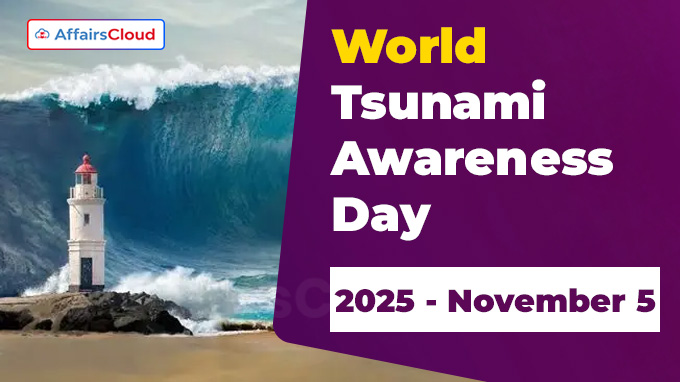The United Nations (UN) observes World Tsunami Awareness Day (WTAD) every year across the globe on 5 November to raise awareness about tsunami risks, promote safety measures, and strengthen early warning systems.
- 5 November 2025, marking the 10th anniversary of WTAD.
Theme:
2025 Theme: “Be Tsunami Ready: Invest in Tsunami Preparedness”.
Focus: Strengthening community resilience through investment in early warning systems, education, and disaster preparedness.
Exam Hints:
- Event: World Tsunami Awareness Day 2025
- When? November 5
- 2025 Theme: “Be Tsunami Ready: Invest in Tsunami Preparedness”
- Declared by :UNGA Resolution A/RES/70/203 on 22 December 2015 (proposal by Japan)
- First observed: 5 November 2016
- Why Nov 5? Commemorates Japan’s Inamura-no-hi legend (1854).
- Lead Agency: UNDRR with UN partners
- Linked Framework: Sendai Framework for Disaster Risk Reduction (SFDRR) 2015–2030
- Tsunami Ready Programme:
- Launched by: UNESCO-IOC
- Goal: 100% at-risk coastal communities Tsunami Ready by 2030
- Recognised communities: Odisha (India) and Büyükçekmece (Türkiye).
Background:
Declaration: On 22 December 2015, the United Nations General Assembly (UNGA) adopted Resolution A/RES/70/203, designating 5 November each year as WTAD, following a proposal by Japan, drawing on its expertise in tsunami management.
Purpose: To enhance understanding of tsunami risks and advance the goals of the Sendai Framework for Disaster Risk Reduction(SFDRR) 2015–2030.
First Observation: The first WTAD was commemorated on 5 November 2016.
Why November 5? The date commemorates Japan’s legend “Inamura-no-hi”, where village leader Goryo Hamaguchi saved his people from a tsunami on 5 November 1854 by burning rice sheaves as a warning.
Implementation: The United Nations Office for Disaster Risk Reduction (UNDRR) leads the observance of WTAD in coordination with other UN agencies and partners.
About Sendai Framework for Disaster Risk Reduction 2015–2030 (SFDRR):
Adoption: The SFDRR is a 15-year global framework adopted at the 3rd UN World Conference on Disaster Risk Reduction, held in March 2015 in Sendai, Miyagi, Japan.
Predecessor: It succeeded the Hyogo Framework for Action, the first comprehensive international agreement on disaster risk reduction.
Objective: To substantially reduce disaster risks and losses in lives, livelihoods, health, and assets across communities and nations by 2030.
2025 Event:
Cairo Commemoration & Multi-Hazard Resilience Forum: On November 9 2025, the Forum to held at Sofitel Cairo Nile El Gezirah, Cairo, Egypt, organised by the UNDRR– Regional Office for Arab States (UNDRR-ROAS), in cooperation with the United Nations Educational, Scientific and Cultural Organization (UNESCO) Egypt and the Government of Egypt.
Focus: The forum uses WTAD to promote tsunami preparedness and broader multi-hazard resilience through education, awareness, and curriculum integration.
Tsunami Ready Programme :
Programme: It was launched by the Intergovernmental Oceanographic Commission (IOC) of UNESCO, aims to strengthen coastal community resilience.
Target: UNESCO aims to make all at-risk coastal communities Tsunami Ready by 2030.
Global Reach:Initially launched in select regions, the Tsunami Ready Programme is now expanding worldwide, with Odisha in India and Büyükçekmece in Türkiye among the recognised communities.
Tsunami Early Warning and Readiness Initiatives in India:
ITEWC: Following the December 26, 2004 tsunami, the Government of India (GoI) established the Indian Tsunami Early Warning Centre (ITEWC) at Indian National Centre for Ocean Information Services (INCOIS) in Hyderabad(Telangana), which has been operational since October 2007.
Tsunami Ready Villages: In 2020, Noliasahi (Jagatsinghapur) and Venkatraipur (Ganjam) in Odisha became the first two “Tsunami Ready” villages in the Indian Ocean Region (IOR) under the UNESCO-IOC Tsunami Ready Programme, nominated by the Indian Tsunami Ready Board.
- In November 2024, 24 more villages across six coastal districts of Odisha were declared “Tsunami Ready”, raising the total to 26 recognised communities, including renewed certifications for Noliasahi and Venkatraipur.
About United Nations Office for Disaster Risk Reduction (UNDRR):
Head – Kamal Kishore
Headquarters – Geneva, Switzerland
Established – 1999





